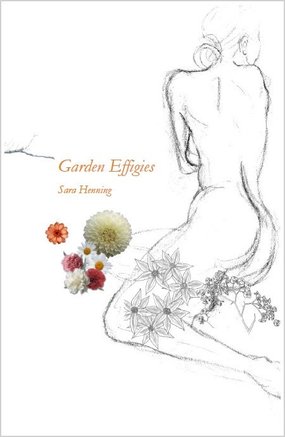
Paperback: 48 pages
Publisher: dancing girl press (2015)
Purchase: @ dancing girl press
Review by April Michelle Bratten
"I never told you that inside every woman's body is a garden she tends when you think she's sleeping."—from “Apostasy Concerning Lingerie and Garden Effigies”
As the title suggests, Garden Effigies primarily endeavors to keep memories close, accessible, and observable. Sara Henning has seamlessly crafted 23 poems—each one an integral fragment to complete a verdant garden.
The speaker in Garden Effigies does more than recount a series of stories. She places the reader intimately inside of them by delving into the memories of women who have experienced a multitude of personal and familial traumas—rape, suicide, and abuse, for example—and the experiences shared about the speaker, the speaker’s mother, and the speaker’s grandmother become the reader’s stories:
Because he no longer remembers her name, my mother buys my grandmother a rooster. Because he falls off a dining room chair, my mother tries to lift him, though he’s swinging fists, elbows. She holds him on his knees, tells him: you’ll never hit me again.
from “Concordance for My Grandfather’s Dementia”
Many of the memories depicted are quite traumatic; however Henning allows space for both her speaker and her readers to grow and gain wisdom from the stories shared. Over the course of the book, the speaker matures and seeks strength because of these memories, not in spite of them. This becomes especially apparent in the poem “Angry”:
I’m telling you, it’s not the door slamming afterward that’s holding me here, like I’m stunned by linoleum. It’s his boots, too scarred to become arbiters, mapping the breach of dirt and sole.
Tell me you don’t understand this wipe up the floor with his shirt kind of angry, this bury it in the yard afterwards kind of angry.
I can’t help thinking about my grandmother riding her Schwinn four miles to the liquor store to buy my grandfather’s booze, the way she believed him when he told her she was too stupid to drive.
Through memory the speaker parallels her partner and herself to her grandfather’s past treatment of her grandmother. This generational cycle of pain was compelling and shaped the arc of the book. Although this theme was not as apparent in most of the poems as it is in the example above, the reader is aware that the speaker’s experience is deftly shaped by her female relatives’ stories, and that their memories are planted into the speaker’s story.
Often vulnerable, but never delicate, Henning’s voice is confident, at times even aggressive, all the while remaining elegant and rich. Her poems are a delight to read aloud. In what appears to be a trademark of her work, Henning places a tremendous amount of emphasis on sound—alliteration and sharp consonants over soft vowels are used often:
Every unburied delta
that moved through her body
became a torrent
disgracing her starboard.
Every lover exploiting her
Water’s plush vertigo a lesson
In spindrifts, sternways,
Shells that sliver her toes.
from “The Art of Drowning, the Art of War”
Henning’s controlled and smart use of language was an effective tool throughout Garden Effigies. In “Sisters of the Crop,” a horrific discovery of a childhood friend’s abuse is elevated with Henning’s startling poetry:
When you pull my mother
into the bathroom
after school to show her
the story of your mother
forcing you onto
your bed face-down,
using her belt to finish you,
I don’t see you again.
Sara Henning seems to be communicating to her readers that alarming memories such as the ones illustrated in Garden Effigies might still flicker and remain close to the surface for a reason. Through these poems Henning gives voice to the possibility of inhabiting the dark spaces and attempting to find a way to own them: “It’s the way my mother, who can’t comfort herself, tries to comfort me now, when all I can do is float somewhere between her stories and my stories, between reason and repossession.”
Publisher: dancing girl press (2015)
Purchase: @ dancing girl press
Review by April Michelle Bratten
"I never told you that inside every woman's body is a garden she tends when you think she's sleeping."—from “Apostasy Concerning Lingerie and Garden Effigies”
As the title suggests, Garden Effigies primarily endeavors to keep memories close, accessible, and observable. Sara Henning has seamlessly crafted 23 poems—each one an integral fragment to complete a verdant garden.
The speaker in Garden Effigies does more than recount a series of stories. She places the reader intimately inside of them by delving into the memories of women who have experienced a multitude of personal and familial traumas—rape, suicide, and abuse, for example—and the experiences shared about the speaker, the speaker’s mother, and the speaker’s grandmother become the reader’s stories:
Because he no longer remembers her name, my mother buys my grandmother a rooster. Because he falls off a dining room chair, my mother tries to lift him, though he’s swinging fists, elbows. She holds him on his knees, tells him: you’ll never hit me again.
from “Concordance for My Grandfather’s Dementia”
Many of the memories depicted are quite traumatic; however Henning allows space for both her speaker and her readers to grow and gain wisdom from the stories shared. Over the course of the book, the speaker matures and seeks strength because of these memories, not in spite of them. This becomes especially apparent in the poem “Angry”:
I’m telling you, it’s not the door slamming afterward that’s holding me here, like I’m stunned by linoleum. It’s his boots, too scarred to become arbiters, mapping the breach of dirt and sole.
Tell me you don’t understand this wipe up the floor with his shirt kind of angry, this bury it in the yard afterwards kind of angry.
I can’t help thinking about my grandmother riding her Schwinn four miles to the liquor store to buy my grandfather’s booze, the way she believed him when he told her she was too stupid to drive.
Through memory the speaker parallels her partner and herself to her grandfather’s past treatment of her grandmother. This generational cycle of pain was compelling and shaped the arc of the book. Although this theme was not as apparent in most of the poems as it is in the example above, the reader is aware that the speaker’s experience is deftly shaped by her female relatives’ stories, and that their memories are planted into the speaker’s story.
Often vulnerable, but never delicate, Henning’s voice is confident, at times even aggressive, all the while remaining elegant and rich. Her poems are a delight to read aloud. In what appears to be a trademark of her work, Henning places a tremendous amount of emphasis on sound—alliteration and sharp consonants over soft vowels are used often:
Every unburied delta
that moved through her body
became a torrent
disgracing her starboard.
Every lover exploiting her
Water’s plush vertigo a lesson
In spindrifts, sternways,
Shells that sliver her toes.
from “The Art of Drowning, the Art of War”
Henning’s controlled and smart use of language was an effective tool throughout Garden Effigies. In “Sisters of the Crop,” a horrific discovery of a childhood friend’s abuse is elevated with Henning’s startling poetry:
When you pull my mother
into the bathroom
after school to show her
the story of your mother
forcing you onto
your bed face-down,
using her belt to finish you,
I don’t see you again.
Sara Henning seems to be communicating to her readers that alarming memories such as the ones illustrated in Garden Effigies might still flicker and remain close to the surface for a reason. Through these poems Henning gives voice to the possibility of inhabiting the dark spaces and attempting to find a way to own them: “It’s the way my mother, who can’t comfort herself, tries to comfort me now, when all I can do is float somewhere between her stories and my stories, between reason and repossession.”

SARA HENNING is the author of A Sweeter Water, her debut collection of poetry, as well as two chapbooks, Garden Effigies and To Speak of Dahlias. Her work has appeared or is forthcoming in such journals as Quarterly West, Green Mountains Review, Crab Orchard Review, Meridian, and RHINO. Winner of the 2015 Lynda Hull Memorial Poetry Prize, she is currently a doctoral student in English and Creative Writing at the University of South Dakota, where she serves as co-director of the Tumbleweed Graduate Reading Series, as associate editor of Sundress Publications, and as assistant editor of Rogue Agent, a Sundress-affiliated journal for work that inhabits the body. You can find out more at http://www.sarahenning.net/
